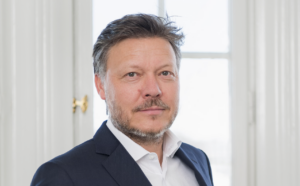
After more than 40 years of operation, DTVE is closing its doors and our website will no longer be updated daily. Thank you for all of your support.
Viaplay to recapitalise, exit UK, Poland and Baltics
Viaplay has seen its shares dive 75% after unveiling a recapitalisation plan ahead of its delayed Q3 results, with the embattled Nordic streamer also confirming it will be exiting the Baltics, Poland and the UK and selling its Central and Eastern European production group Paprika Studios.

Jørgen Madsen Lindemann (Source: Viaplay)
The streamer revealed its operating income had declined SEK321 million (US$31m) in Q3 while net income had plummeted SEK693 million, with the company blaming “substantial losses” in “non-core international markets” such as the UK, which it has already said it will close.
Nordic profits were also impacted by lower advertising sales, inflation in content costs and currency exchange rate fluctuations, but the company blamed the decline on operations in Poland, the Baltics and the UK.
Viaplay, which delayed its Q3 results for the second time earlier this week, said losses in these markets would be higher than expected, confirming that it is selling its UK-based Premier Sports operation back to the company it bought it from less than a year ago.
It will also exit the Baltic and Polish markets by summer 2025, with the cost of exiting these markets estimated at SEK 2.2bn.
Viaplay has also struck a recapitalisation plan with its largest shareholders and debt providers that will see SEK 4bn being injected into the company.
The plan, which is being supported by Canal+ and PPF, will see new share issued and SEK 2bn of debt being written down.
Exiting international markets
The Nordic streamer, which has been led by president & CEO Jørgen Madsen Lindemann since the exit of Anders Jensen in June,
Lindemann said Viaplay’s overhaul, which has seen it cut 30% of jobs and introduce a country-based operating model, had translated into an improved performance in its home markets.
“Our core Nordic, Netherlands and Viaplay Select operations have stable Viaplay subscriber volumes and rising ARPU levels, a much-improved content mix, and growing content sales to third party platforms. We are well on track to reach our year end revenue and profitability targets for these operations, as we set out in July,” he said.
However, Lindemann added that the performance in non-core markets had hit group revenues hard, while combined advertising sales oin the Nordics were down 10%.
“The route to profitability for these operations is not clear or realistic, which is why we have now reached agreement to sell our UK operation, subject to regulatory approval, and we will exit the Baltic and Polish markets by summer 2025.
“The negative cash effect of exiting these loss-making operations will be approximately SEK 2.2 billion over the coming years. In addition, we have reached agreement to sell our Paprika Studios content production business, subject to shareholder approval, which will further sharpen our Nordic focus.”
Group organic sales were up 7% in Q3, primarily driven by 17% organic sales growth in Viaplay, which now accounts for 52% of group net sales.
Nordic organic sales growth was 3%, with Viaplay delivering 9% organic sales growth and accounting for 43% of total Nordic net sales. Full year operating losses are now expected to come in at between SEK 1bn-1.5bn.
“We understand the current state, and future potential, of the business, our products, and our people. The energy, enthusiasm, and enterprise of our teams, especially in these challenging times, is fantastic to see.
“We have much to achieve together and the proposed recapitalisation of the business is a necessary part of resetting the Group for a much more sustainable future, where our attention and resources are focused on those markets where we can compete for the long term, and where our products are relevant, popular and generate healthy returns,” Lindemann said.
Lindemann added that Viaplay is now also planning to sell production outfit Paprika, which operates across nine countries in CEE.
It is led by CEO Akos Erdos and produces more than 600 hours of programming annually for broadcasters and streamers, with both scripted and unscripted shows on its slate.

